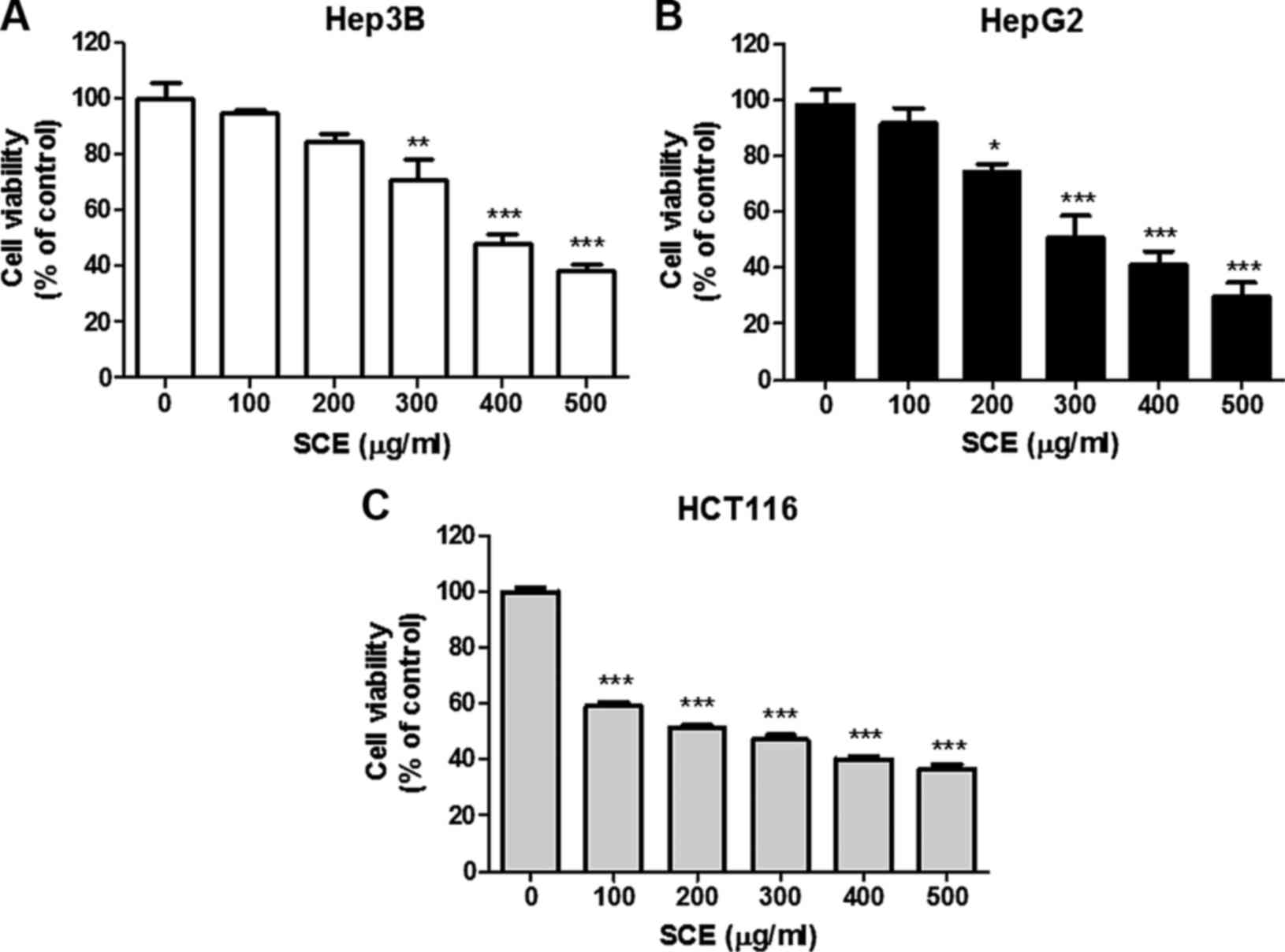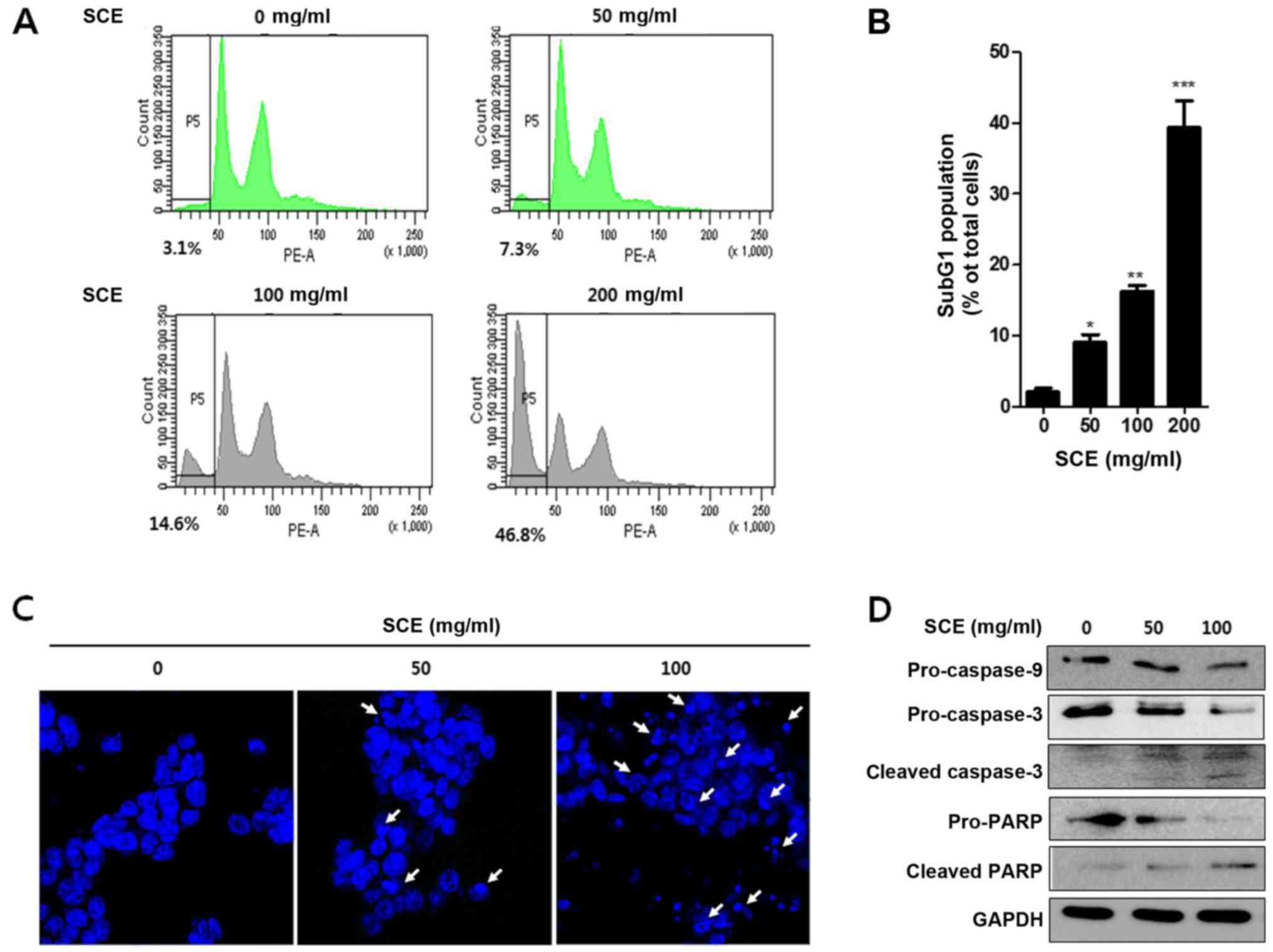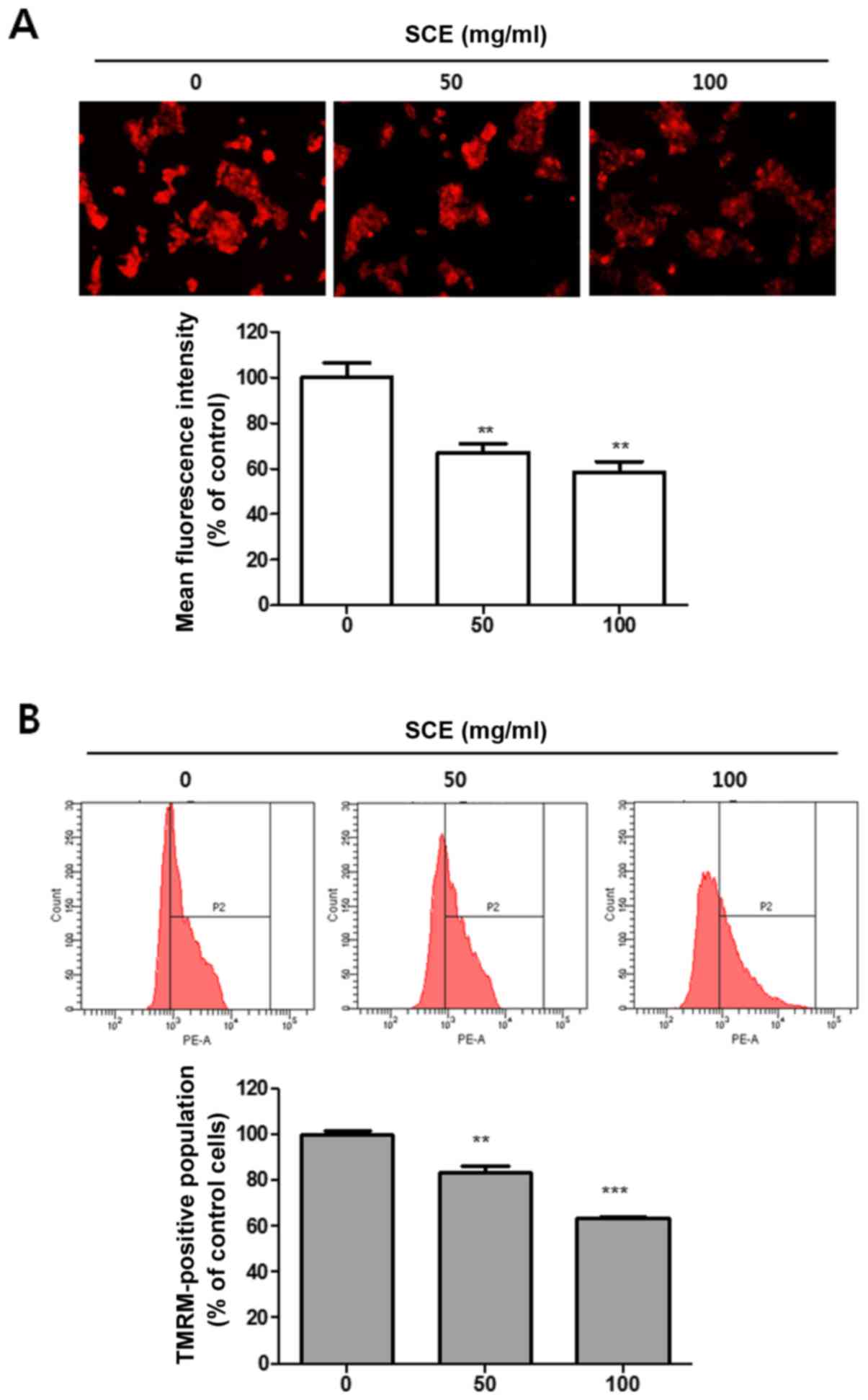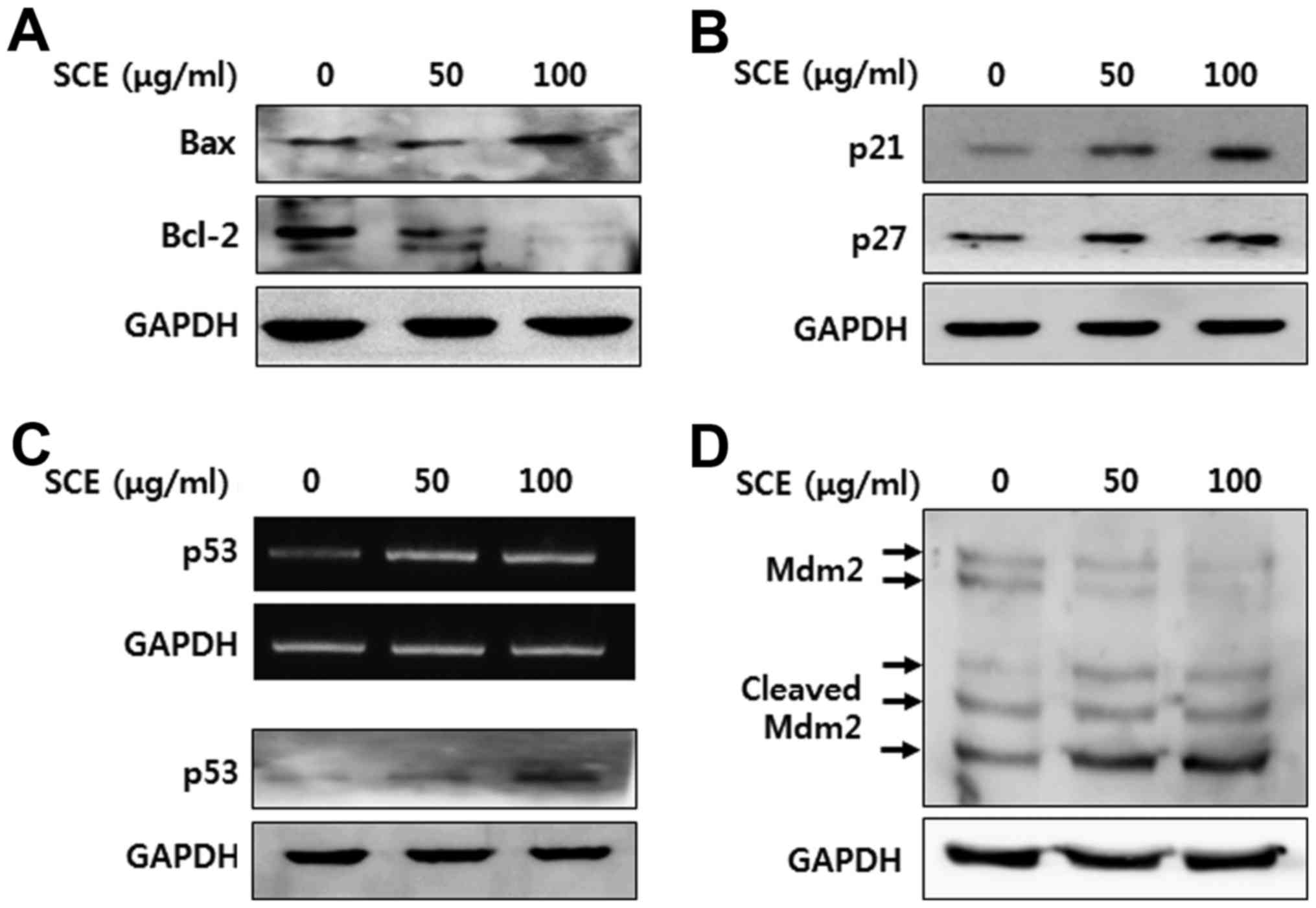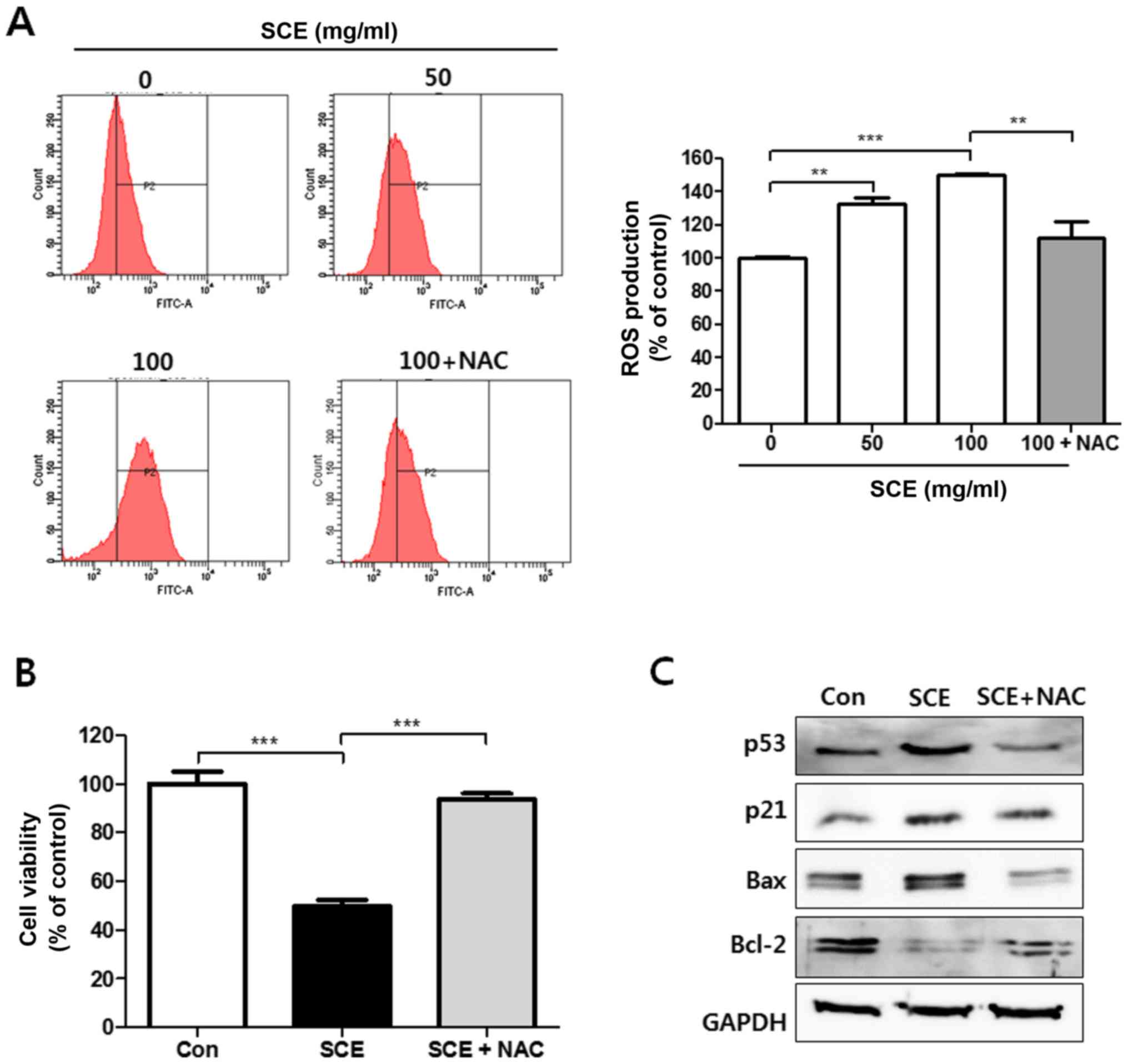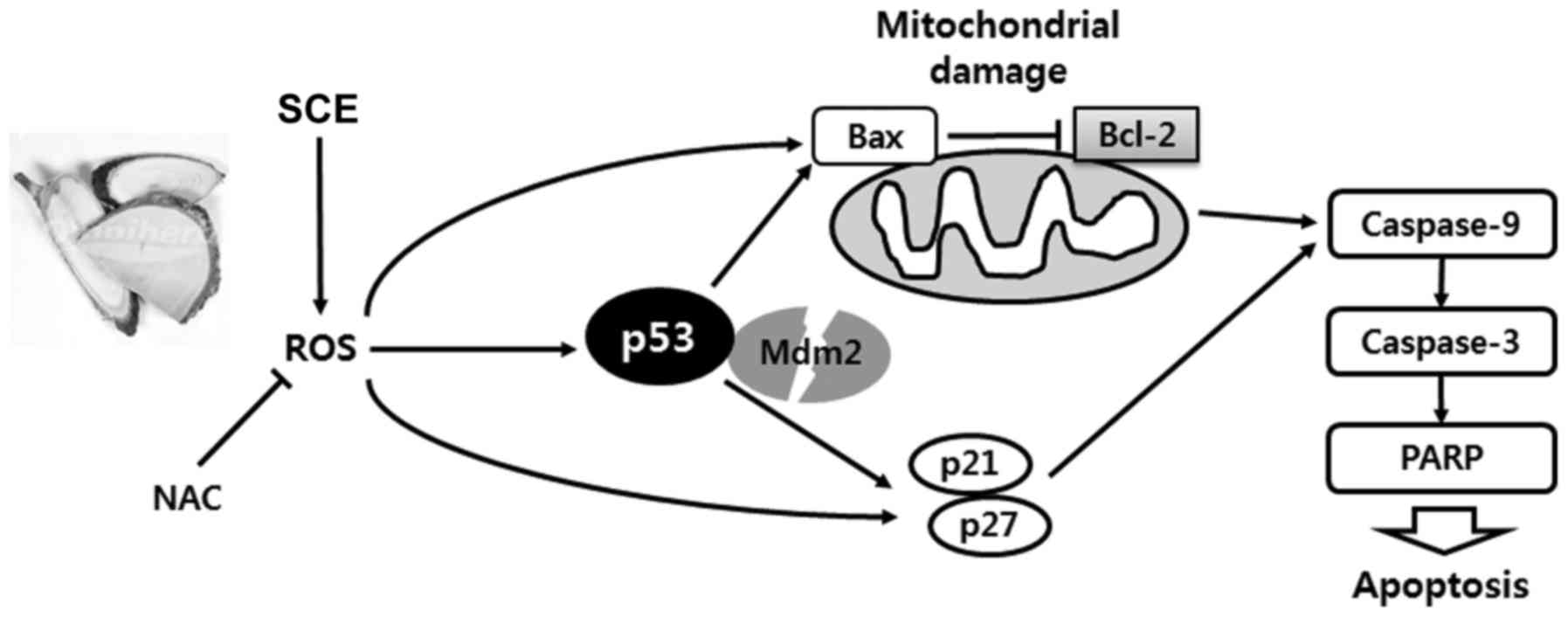|
1
|
Baig S, Seevasant I, Mohamad J, Mukheem A,
Huri HZ and Kamarul T: Potential of apoptotic pathway-targeted
cancer therapeutic research: Where do we stand? Cell Death Dis.
7:e20582016. View Article : Google Scholar : PubMed/NCBI
|
|
2
|
Hanahan D and Weinberg RA: Hallmarks of
cancer: The next generation. Cell. 144:646–674. 2011. View Article : Google Scholar : PubMed/NCBI
|
|
3
|
Fulda S and Debatin KM: Extrinsic versus
intrinsic apoptosis pathways in anticancer chemotherapy. Oncogene.
25:4798–4811. 2006. View Article : Google Scholar : PubMed/NCBI
|
|
4
|
Pistritto G, Trisciuoglio D, Ceci C,
Garufi A and D'Orazi G: Apoptosis as anticancer mechanism: Function
and dysfunction of its modulators and targeted therapeutic
strategies. Aging (Albany NY). 8:603–619. 2016. View Article : Google Scholar : PubMed/NCBI
|
|
5
|
Wang H, Yin Y, Wang P, Xiong C, Huang L,
Li S, Li X and Fu L: Current situation and future usage of
anticancer drug databases. Apoptosis. 21:778–794. 2016. View Article : Google Scholar : PubMed/NCBI
|
|
6
|
Gill BS, Kumar S and Navgeet: Triterpenes
in cancer: Significance and their influence. Mol Biol Rep.
43:881–896. 2016. View Article : Google Scholar : PubMed/NCBI
|
|
7
|
Milani A, Basirnejad M, Shahbazi S and
Bolhassani A: Carotenoids: Biochemistry, pharmacology and
treatment. Br J Pharmacol. 174:1290–1324. 2017. View Article : Google Scholar : PubMed/NCBI
|
|
8
|
Niedzwiecki A, Roomi MW, Kalinovsky T and
Rath M: Anticancer efficacy of polyphenols and their combinations.
Nutrients. 8:E5522016. View Article : Google Scholar : PubMed/NCBI
|
|
9
|
Zhang YS, Shen Q and Li J: Traditional
Chinese medicine targeting apoptotic mechanisms for esophageal
cancer therapy. Acta Pharmacol Sin. 37:295–302. 2016. View Article : Google Scholar : PubMed/NCBI
|
|
10
|
McAllister H: The genus sorbus: Mountain
ash and other rowansRoyal Botanic Gardens. KEW; Surrey, UK:
2005
|
|
11
|
Yang G and An HJ:
β-sitosteryl-3-O-β-glucopyranoside isolated from the bark of Sorbus
commixta ameliorates pro-inflammatory mediators in RAW 264.7
macrophages. Immunopharmacol Immunotoxicol. 36:70–77. 2014.
View Article : Google Scholar : PubMed/NCBI
|
|
12
|
Yu T, Lee YJ, Jang HJ, Kim AR, Hong S, Kim
TW, Kim MY, Lee J, Lee YG and Cho JY: Anti-inflammatory activity of
Sorbus commixta water extract and its molecular inhibitory
mechanism. J Ethnopharmacol. 134:493–500. 2011. View Article : Google Scholar : PubMed/NCBI
|
|
13
|
Kang DG, Sohn EJ, Lee AS, Kim JS, Lee DH
and Lee HS: Methanol extract of Sorbus commixta cortex prevents
vascular inflammation in rats with a high fructose-induced
metabolic syndrome. Am J Chin Med. 35:265–277. 2007. View Article : Google Scholar : PubMed/NCBI
|
|
14
|
Sohn EJ, Kang DG, Choi DH, Lee AS, Mun YJ,
Woo WH, Kim JS and Lee HS: Effect of methanol extract of Sorbus
cortex in a rat model of L-NAME-induced atherosclerosis. Biol Pharm
Bull. 28:1239–1243. 2005. View Article : Google Scholar : PubMed/NCBI
|
|
15
|
Sohn EJ, Kang DG, Mun YJ, Woo WH and Lee
HS: Anti-atherogenic effects of the methanol extract of Sorbus
cortex in atherogenic-diet rats. Biol Pharm Bull. 28:1444–1449.
2005. View Article : Google Scholar : PubMed/NCBI
|
|
16
|
Lee SO, Lee HW, Lee IS and Im HG: The
pharmacological potential of Sorbus commixta cortex on blood
alcohol concentration and hepatic lipid peroxidation in acute
alcohol-treated rats. J Pharm Pharmacol. 58:685–693. 2006.
View Article : Google Scholar : PubMed/NCBI
|
|
17
|
Liu QF, Lee JH, Kim YM, Lee S, Hong YK,
Hwang S, Oh Y, Lee K, Yun HS, Lee IS, et al: In vivo screening of
traditional medicinal plants for neuroprotective activity against
Aβ42 cytotoxicity by using drosophila models of Alzheimer's
disease. Biol Pharm Bull. 38:1891–1901. 2015. View Article : Google Scholar : PubMed/NCBI
|
|
18
|
Bae JT, Sim GS, Kim JH, Pyo HB, Yun JW and
Lee BC: Antioxidative activity of the hydrolytic enzyme treated
Sorbus commixta Hedl. and its inhibitory effect on matrix
metalloproteinase-1 in UV irradiated human dermal fibroblasts. Arch
Pharm Res. 30:1116–1123. 2007. View Article : Google Scholar : PubMed/NCBI
|
|
19
|
Na M, Kim BY, Osada H and Ahn JS:
Inhibition of protein tyrosine phosphatase 1B by lupeol and
lupenone isolated from Sorbus commixta. J Enzyme Inhib Med Chem.
24:1056–1059. 2009. View Article : Google Scholar : PubMed/NCBI
|
|
20
|
Nikolaienko RM, Agyekum B and Bouyain S:
Receptor protein tyrosine phosphatases and cancer: New insights
from structural biology. Cell Adh Migr. 6:356–364. 2012. View Article : Google Scholar : PubMed/NCBI
|
|
21
|
Ostman A, Hellberg C and Böhmer FD:
Protein-tyrosine phosphatases and cancer. Nat Rev Cancer.
6:307–320. 2006. View Article : Google Scholar : PubMed/NCBI
|
|
22
|
Millimouno FM, Dong J, Yang L, Li J and Li
X: Targeting apoptosis pathways in cancer and perspectives with
natural compounds from mother nature. Cancer Prev Res (Phila).
7:1081–1107. 2014. View Article : Google Scholar : PubMed/NCBI
|
|
23
|
Safarzadeh E, Shotorbani Sandoghchian S
and Baradaran B: Herbal medicine as inducers of apoptosis in cancer
treatment. Adv Pharm Bull. 4:421–427. 2014.PubMed/NCBI
|
|
24
|
Brunelle JK and Letai A: Control of
mitochondrial apoptosis by the Bcl-2 family. J Cell Sci.
122:437–441. 2009. View Article : Google Scholar : PubMed/NCBI
|
|
25
|
Kitagishi Y, Kobayashi M and Matsuda S:
Protection against cancer with medicinal herbs via activation of
tumor suppressor. J Oncol. 2012:2365302012. View Article : Google Scholar : PubMed/NCBI
|
|
26
|
Gao J, Morgan WA, Sanchez-Medina A and
Corcoran O: The ethanol extract of Scutellaria baicalensis and the
active compounds induce cell cycle arrest and apoptosis including
upregulation of p53 and Bax in human lung cancer cells. Toxicol
Appl Pharmacol. 254:221–228. 2011. View Article : Google Scholar : PubMed/NCBI
|
|
27
|
Lee SJ, Park K, Ha SD, Kim WJ and Moon SK:
Gleditsia sinensis thorn extract inhibits human colon cancer cells:
The role of ERK1/2, G2/M-phase cell cycle arrest and p53
expression. Phytother Res. 24:1870–1876. 2010. View Article : Google Scholar : PubMed/NCBI
|
|
28
|
Li B, Zhao J, Wang CZ, Searle J, He TC,
Yuan CS and Du W: Ginsenoside Rh2 induces apoptosis and
paraptosis-like cell death in colorectal cancer cells through
activation of p53. Cancer Lett. 301:185–192. 2011. View Article : Google Scholar : PubMed/NCBI
|
|
29
|
Hastak K, Agarwal MK, Mukhtar H and
Agarwal ML: Ablation of either p21 or Bax prevents p53-dependent
apoptosis induced by green tea polyphenol
epigallocatechin-3-gallate. FASEB J. 19:789–791. 2005. View Article : Google Scholar : PubMed/NCBI
|
|
30
|
Masuda M, Suzui M and Weinstein IB:
Effects of epigallocatechin-3-gallate on growth, epidermal growth
factor receptor signaling pathways, gene expression, and
chemosensitivity in human head and neck squamous cell carcinoma
cell lines. Clin Cancer Res. 7:4220–4229. 2001.PubMed/NCBI
|
|
31
|
Abbas T and Dutta A: p21 in cancer:
Intricate networks and multiple activities. Nat Rev Cancer.
9:400–414. 2009. View Article : Google Scholar : PubMed/NCBI
|
|
32
|
Levkau B, Koyama H, Raines EW, Clurman BE,
Herren B, Orth K, Roberts JM and Ross R: Cleavage of p21Cip1/Waf1
and p27Kip1 mediates apoptosis in endothelial cells through
activation of Cdk2: Role of a caspase cascade. Mol Cell. 1:553–563.
1998. View Article : Google Scholar : PubMed/NCBI
|
|
33
|
Chipuk JE and Green DR: Cytoplasmic p53:
Bax and forward. Cell Cycle. 3:429–431. 2004. View Article : Google Scholar : PubMed/NCBI
|
|
34
|
Miyashita T, Krajewski S, Krajewska M,
Wang HG, Lin HK, Liebermann DA, Hoffman B and Reed JC: Tumor
suppressor p53 is a regulator of bcl-2 and bax gene expression in
vitro and in vivo. Oncogene. 9:1799–1805. 1994.PubMed/NCBI
|
|
35
|
Oren M: Regulation of the p53 tumor
suppressor protein. J Biol Chem. 274:36031–36034. 1999. View Article : Google Scholar : PubMed/NCBI
|
|
36
|
Kruse JP and Gu W: Modes of p53
regulation. Cell. 137:609–622. 2009. View Article : Google Scholar : PubMed/NCBI
|
|
37
|
Ryan KM, Phillips AC and Vousden KH:
Regulation and function of the p53 tumor suppressor protein. Curr
Opin Cell Biol. 13:332–337. 2001. View Article : Google Scholar : PubMed/NCBI
|
|
38
|
Oliver TG, Meylan E, Chang GP, Xue W,
Burke JR, Humpton TJ, Hubbard D, Bhutkar A and Jacks T:
Caspase-2-mediated cleavage of Mdm2 creates a p53-induced positive
feedback loop. Mol Cell. 43:57–71. 2011. View Article : Google Scholar : PubMed/NCBI
|
|
39
|
Pochampally R, Fodera B, Chen L, Shao W,
Levine EA and Chen J: A 60 kd MDM2 isoform is produced by caspase
cleavage in non-apoptotic tumor cells. Oncogene. 17:2629–2636.
1998. View Article : Google Scholar : PubMed/NCBI
|
|
40
|
Macip S, Igarashi M, Berggren P, Yu J, Lee
SW and Aaronson SA: Influence of induced reactive oxygen species in
p53-mediated cell fate decisions. Mol Cell Biol. 23:8576–8585.
2003. View Article : Google Scholar : PubMed/NCBI
|
|
41
|
Johnson TM, Yu ZX, Ferrans VJ, Lowenstein
RA and Finkel T: Reactive oxygen species are downstream mediators
of p53-dependent apoptosis. Proc Natl Acad Sci USA. 93:11848–11852.
1996. View Article : Google Scholar : PubMed/NCBI
|
|
42
|
Liu B, Chen Y and St Clair DK: ROS and
p53: A versatile partnership. Free Radic Biol Med. 44:1529–1535.
2008. View Article : Google Scholar : PubMed/NCBI
|
|
43
|
Polyak K, Xia Y, Zweier JL, Kinzler KW and
Vogelstein B: A model for p53-induced apoptosis. Nature.
389:300–305. 1997. View
Article : Google Scholar : PubMed/NCBI
|
|
44
|
Choi D, Hwang S, Lee E, Yoon S, Yoon BK
and Bae D: Expression of mitochondria-dependent apoptosis genes
(p53, Bax, and Bcl-2) in rat granulosa cells during follicular
development. J Soc Gynecol Investig. 11:311–317. 2004. View Article : Google Scholar : PubMed/NCBI
|
|
45
|
Yang Y, Karakhanova S, Hartwig W, D'Haese
JG, Philippov PP, Werner J and Bazhin AV: Mitochondria and
mitochondrial ROS in cancer: Novel targets for anticancer therapy.
J Cell Physiol. 231:2570–2581. 2016. View Article : Google Scholar : PubMed/NCBI
|
|
46
|
Raudone L, Raudonis R, Gaivelytė K,
Pukalskas A, Viškelis P, Venskutonis PR and Janulis V:
Phytochemical and antioxidant profiles of leaves from different
Sorbus L. species. Nat Prod Res. 29:281–285. 2015. View Article : Google Scholar : PubMed/NCBI
|
|
47
|
Bhatt LR, Bae MS, Kim BM, Oh GS and Chai
KY: A chalcone glycoside from the fruits of Sorbus commixta Hedl.
Molecules. 14:5323–5327. 2009. View Article : Google Scholar : PubMed/NCBI
|
|
48
|
Liu Y, Bi T, Dai W, Wang G, Qian L, Shen G
and Gao Q: Lupeol induces apoptosis and cell cycle arrest of human
osteosarcoma cells through PI3K/AKT/mTOR pathway. Technol Cancer
Res Treat. 15:NP16–NP24. 2016. View Article : Google Scholar : PubMed/NCBI
|
|
49
|
Sook SH, Lee HJ, Kim JH, Sohn EJ, Jung JH,
Kim B, Kim JH, Jeong SJ and Kim SH: Reactive oxygen
species-mediated activation of AMP-activated protein kinase and
c-Jun N-terminal kinase plays a critical role in
beta-sitosterol-induced apoptosis in multiple myeloma U266 cells.
Phytother Res. 28:387–394. 2014. View Article : Google Scholar : PubMed/NCBI
|















